SAS Urban Survival Handbook (28 page)
Read SAS Urban Survival Handbook Online
Authors: John Wiseman
Tags: #Health & Fitness, #Reference, #Survival, #Fiction, #Safety, #Self-Help, #Personal & Practical Guides, #General, #Survival Skills

Depending on how dirty the job has been, have a thorough wash or shower—not forgetting your hair and fingernails. Even the smallest traces of some toxic substances could be injurious over a period of time.
REMEMBER
If disposing of any DIY rubbish in household rubbish collections, make sure it is all safe. Young children and pets seem to like rubbish bags. You should NOT use the domestic waste system for toxic or dangerous substances.
Wrap up broken glass or knife blades. Sharp objects may pierce the refuse sack and badly cut hands or legs—maybe yours!
BASIC TOOLS
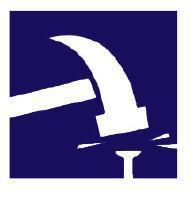 The use of even traditional workshop tools is risky. As new tools are added to the toolbox, the only way to familiarize yourself with them is to use them. Suppliers, manufacturers and regular or professional tool-users may be able to advise you.
The use of even traditional workshop tools is risky. As new tools are added to the toolbox, the only way to familiarize yourself with them is to use them. Suppliers, manufacturers and regular or professional tool-users may be able to advise you.
Hammers/mallets/stone hammers
Hammers
are for driving in nails and tacks. Depending on the style of hammer, one side of the head performs the basic nailing task. The other may be a narrow rectangular head (A) for coping with small nails, too delicate for normal hammer blows, or for nailing into mouldings (cross-pein hammer).
A rounded head (B) is really for use with sheet metal (hemispherical-pein). The more common claw head (C) is for removing protruding or badly-driven nails (D).
DON’T use hammers to bash wooden- or plastic-handled tools such as chisels or screwdrivers. Cheap or thin-handled claw hammers should be avoided—they may snap when you are trying to pull out deep or stubborn nails.
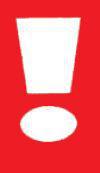
WARNING
If you miss badly with a hammer, and the handle takes the blow behind the head, the handle may snap—and the head may fly off. Don’t raise the hammer excessively. Several medium blows are better than a couple of very hefty ones. Always check that the handle is sound and the head well-fixed.
Mallets
(E) are for tapping wood- or plastic-handled tools such as chisels OR for tapping joints together when assembling joinery. Rubber- or leather-faced hammers (F) are available for more delicate work.
Heavy
club hammers
are used with special (cold) chisels to chip into concrete, bricks or paving slabs.

WARNING
If using a club hammer and cold chisel on stone or very hard surfaces, ALWAYS wear eye protection and strong gloves. Debris has an uncanny knack of finding your eyes. A misdirected blow could damage your hand. Watch out for the ‘burrs’ which occur on the chisel top after a while. These could cut a hand or break and fly off. File them down.
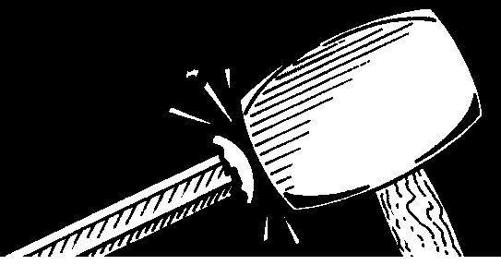
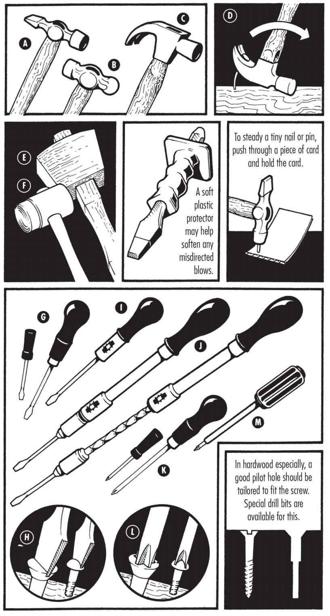
Screwdrivers
Square-ended screwdrivers
(G) should fit the screws you are using them for (H). It is worth having more than one size—or a GOOD QUALITY set with interchangeable bits. Ordinary screwdrivers can be hard work—blisters are common.
Rachet screwdrivers
(I) are handy—you don’t have to release your grip. Most are adjustable to provide the rachet action for screwing or unscrewing, plus a fixed position to allow for use as a conventional screwdriver.
Spiral-rachet screwdrivers
(J) are a must for the serious DIY enthusiast or professional, but USE WITH CARE. When released, these tools shoot out to full length and could easily take out an eye or pierce the skin. NEVER point towards your face or at anyone. Slips with these tools can often be very nasty. Keep an eye on where the bit will go if you DO slip. With spiral-rachet screwdrivers, close the tool for final tightening of screws. Most have interchangeable bits.
Cross-headed screwdrivers
(K) should also fit the screws that they are used for (L)—in practice, only one small ‘electrical’ one, and one larger type are needed.
Electrical screwdrivers
(M) should offer genuine protection from accidents with electricity. Handles should be shielded with rubber. Some double as ‘testers’—a neon, or similar, in the handle lights up if the screwdriver touches a live terminal or wire.
NEVER
work on appliances which are connected to the main supply.
NEVER
work on a live circuit.
Using screws
Avoid undue pressure, which might cause an accident, when driving in screws by:
- ◑ Drilling correct pilot holes.
- ◑ Lubricating the threads only of screws with oil or grease—NOT the head—this increases the risk of slipping.
- ◑ Not using too long a screw.
- ◑ Using a screwdriver that fits the screw.

WARNING
If a square-ended screwdriver shows wear and tear—reshape the tip, or ask a dealer to have it done for you. A worn tip increases the chance of slipping or fouling the head of the screw, producing sharp burrs.
Chisels
If you intend to use chisels, perhaps to cut a slot for a hinge or to fit a lock, one is not enough. You will need several. Store them safely—either with the ends covered, or in a rack—and keep them very sharp. A blunt chisel requires force and accidents are common. Sharpening is a critical process involving an oilstone—and can take a lot of practice.

WARNING
NEVER exert great pressure on a chisel or screwdriver with your hand or any other part of your body in direct ‘line of fire’ if you slip. ALWAYS work on a firm surface—not on your lap!
Always remove wood PATIENTLY in small amounts, NOT by digging and gouging. If chisel is sharp it should do the work for you.
Mortise (A) and firmer (B) chisels are mainly for CHOPPING OUT wood.
Paring (C) chisels are for SHAVING AWAY wood to clean up – not for levering.
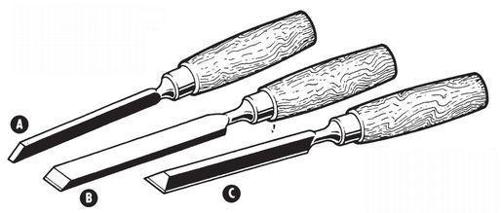
Bradawls/awls
Whether square-ended (bradawl) or pointed (awl), they may be good enough to make pilot holes for screws in softwood. Keep them sharp. DON’T use a lot of pressure. DON’T get in the ‘line of fire’ if you slip—NEVER work into your hand or on your lap. Protect tips and your fingers by jamming a cork on the points when not in use.